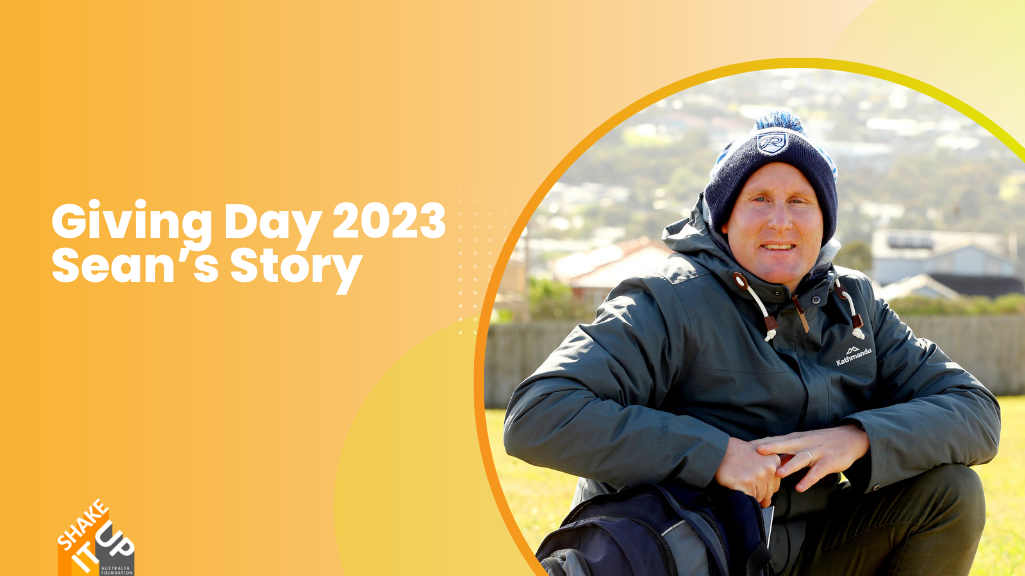
Did you know November 29 is International Giving Day? It’s a day when the global community will come together to donate to good causes, and we’re asking for your help to raise $38,000 for the 38 Aussies diagnosed with Parkinson’s every day.
Your donation allows us to continue our mission to accelerate innovative Australian research into better treatments and ultimately, a cure for Parkinson’s disease.
In the lead up to Giving Day, we’re hearing from Australians living with Parkinson’s, to share their story, and tell us what support for research will mean for them.
Sean’s Story
In January this year, Sean was diagnosed with Early Onset Parkinson’s Disease at just 36 years of age. The diagnosis came as a shock to Sean and his family, with no family history of the disease. Since being diagnosed, Sean has committed to raising funds and awareness for essential research into better treatments and a cure for Parkinson’s disease with an upcoming hike to Mt Everest in 2024. Here’s our Q&A with Sean.
What inspired you to trek to Everest?
Since being diagnosed with Parkinson’s disease in January 2023, I was really keen to do something challenging and worthy enough to draw people’s attention to raising awareness for Parkinson’s disease. I was contemplating riding across Australia or running a certain distance however trying to manage work, family, and social commitments it was going to be difficult to put the time in to train. I am 36 years young and still have so much of my life to live and I didn’t want to let this disease stop me yet from achieving great things in life. Everest was never on the radar until a mate threw out the idea and I loved it. There will be tough moments hiking for back-to-back days and managing my symptoms with cold weather heightening the symptoms of Parkinson’s disease.
Why do you think it is so important to fund innovative Parkinson’s research?
Parkinson’s disease is the fastest growing neurological disorder in the world. This is a key indicator that there needs to be more funding made available for research. There are so many unknowns about the disease, and symptoms in people are so different, it shows the need for more research to find the answers that will lead to a cure.
When I was diagnosed with the disease, it took 2 different neurologists and multiple appointments and scans to make to make the diagnosis. Technology hasn’t progressed to be able scan the brain in enough depth and detail to make the diagnosis of Parkinson’s disease simple. It took an experienced neurologist to notice my symptoms as I walked into the room and the impact of medication for me to receive my diagnosis. We need more funds for research and development to bridge this technological gap.
What is one thing you wish people understood more about Parkinson’s disease?
To me, the biggest unknown with this disease is the vast variety of symptoms that each person encounters. There is no “cheat sheet” or “cookie cutter” approach to people having this disease, which I don’t believe people are aware of. Many people just assume that when you have Parkinson’s, you have tremors and balance issues and not all the other symptoms that people with the disease must manage. Things like muscle soreness, inability to write with a pen for periods of time, and sleep challenges, are common to my journey, and most wouldn’t associate with the disease. There needs to be further awareness of the disease so that people are aware of how common it is amongst our communities.
Our mission is to slow, stop and cure Parkinson’s through research. What would that mean for you?
I am a 36-year-old who has been diagnosed with early onset Parkinson’s. Before my diagnosis, I thought I was healthy with a normal life ahead of me. This has obviously all changed, and my life is potentially going to be different and more challenging for me and my family. Being relatively young, the slow, stop and cure Parkinson’s statement is so important to me and is something that I really resonate with. Any way to slow the progression the disease will improve my long-term quality of life and give me a better time with my wife and kids.
Make a donation for Giving Day 2023
Can you help us change the future for the 200,000 Australians living with Parkinson’s? 100% of your donation will go directly to research, thanks to our founding directors’ commitment to cover all administration costs. Your help is making a real difference to change the future for people with Parkinson’s.


